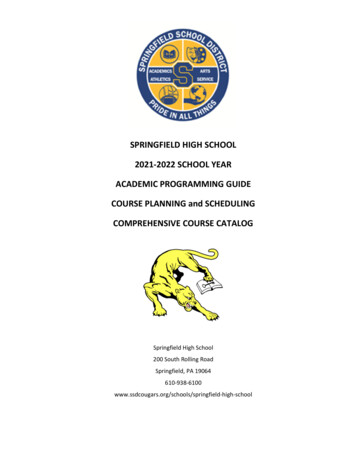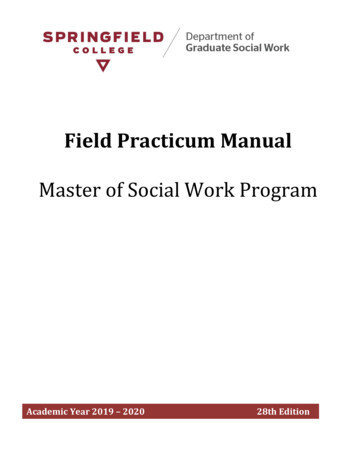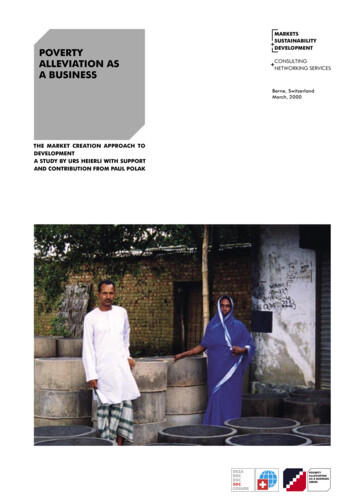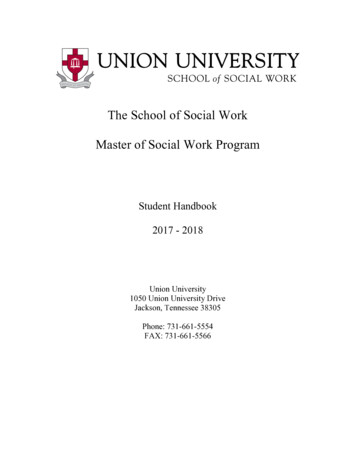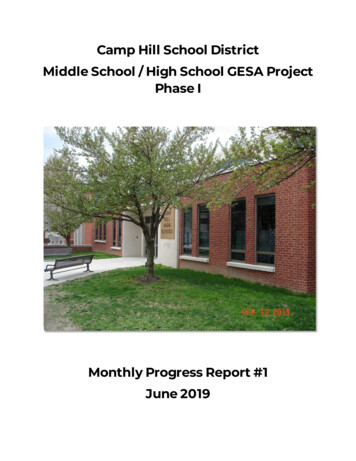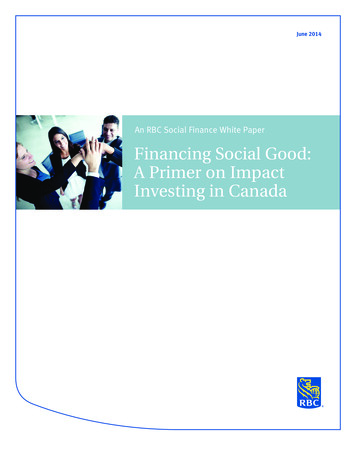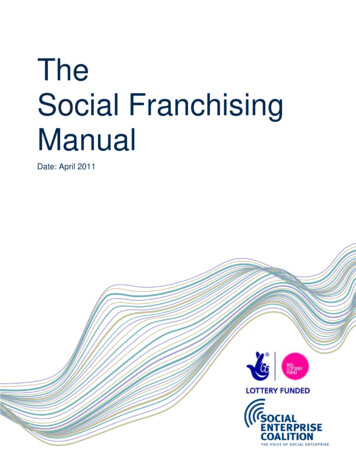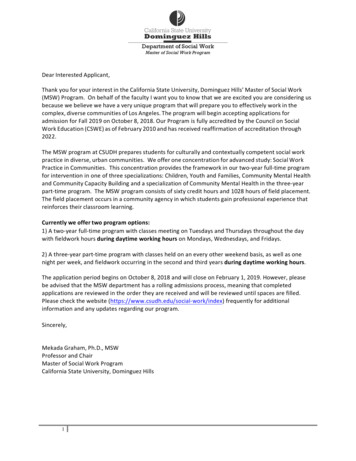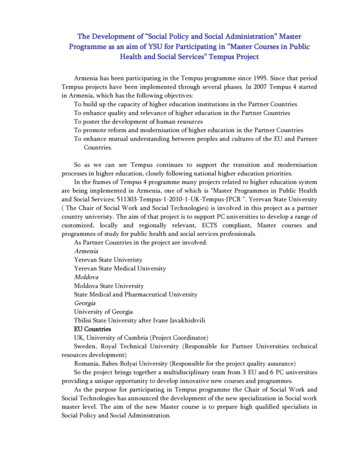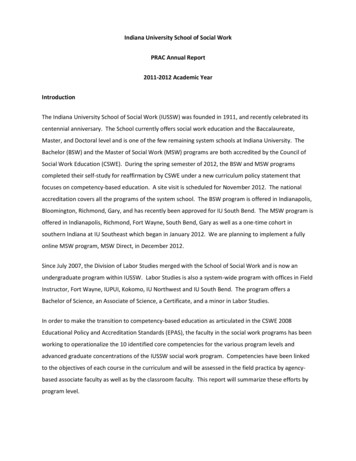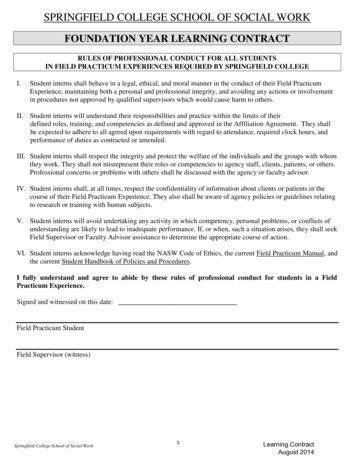
Transcription
SPRINGFIELD COLLEGE SCHOOL OF SOCIAL WORKFOUNDATION YEAR LEARNING CONTRACTRULES OF PROFESSIONAL CONDUCT FOR ALL STUDENTSIN FIELD PRACTICUM EXPERIENCES REQUIRED BY SPRINGFIELD COLLEGEI.Student interns shall behave in a legal, ethical, and moral manner in the conduct of their Field PracticumExperience, maintaining both a personal and professional integrity, and avoiding any actions or involvementin procedures not approved by qualified supervisors which would cause harm to others.II. Student interns will understand their responsibilities and practice within the limits of theirdefined roles, training, and competencies as defined and approved in the Affiliation Agreement. They shallbe expected to adhere to all agreed upon requirements with regard to attendance, required clock hours, andperformance of duties as contracted or amended.III. Student interns shall respect the integrity and protect the welfare of the individuals and the groups with whomthey work. They shall not misrepresent their roles or competencies to agency staff, clients, patients, or others.Professional concerns or problems with others shall be discussed with the agency or faculty advisor.IV. Student interns shall, at all times, respect the confidentiality of information about clients or patients in thecourse of their Field Practicum Experience. They also shall be aware of agency policies or guidelines relatingto research or training with human subjects.V. Student interns will avoid undertaking any activity in which competency, personal problems, or conflicts ofunderstanding are likely to lead to inadequate performance. If, or when, such a situation arises, they shall seekField Supervisor or Faculty Advisor assistance to determine the appropriate course of action.VI. Student interns acknowledge having read the NASW Code of Ethics, the current Field Practicum Manual, andthe current Student Handbook of Policies and Procedures.UUUI fully understand and agree to abide by these rules of professional conduct for students in a FieldPracticum Experience.Signed and witnessed on this date:Field Practicum StudentField Supervisor (witness)Springfield College School of Social Work5Learning ContractAugust 2014
The Learning Contract is developed by student and Field Supervisor in consultation with Faculty Advisoras needed. Completed and signed by Field Supervisor and student not later than October 1. Attach additional pages if needed. To be provided to Faculty Advisor for review and signature at Fall Site Visit.DO NOT REMOVETHE LEARNING CONTRACT FROM THE FIELD PRACTICUM WORKBOOKIt is strongly recommended that students and Field Supervisors make copies for their own use and records.Student Name:Weekday ProgramWeekend ProgramEmployment-Based PracticumAgency Name:Address: City: State:Field Supervisor: Telephone:Email Address:Learning Contract Period:Begin End (Dates practicum is expected to begin and end)REGULAR SCHEDULE OF PRACTICUM rWeekly supervision session is scheduled for:BRIEF DESCRIPTION OF FIELD PRACTICUM ACTIVITIES AND RESPONSIBILITIES:Size of Direct Service Caseload:(Typically expected to be four to five individual cases or families. Caseload size will vary, depending on agency mission, complexity ofcases, type of service provided, number of groups student is assigned, and other factors. Depending on the agency, screening, assessment,and brief treatment or crisis services can qualify to meet these expectations)Springfield College School of Social Work6Learning ContractAugust 2014
Learning Contract Information and Signatures The Learning Contract details the areas of skill development expected of the student in the field practicumexperience. Please read the content carefully and note the learning activities that will be used to assurestudents have practiced and acquired the requisite skills. The Learning Contract should be made available to the Faculty Advisor for review and use during sitevisits to monitor learning and progress in skill development. An approval of the Learning Contract andsignature verifying this approval from the Faculty Advisor is needed at the time of the first site visit. The completed and signed Learning Contract (retained in the Field Practicum Workbook), along with thecompleted and signed evaluations for that semester, must be present in the Workbook at the conclusion ofeach semester in order for the student to receive grades for the field practicum experience from the FacultyAdvisor.UU Renegotiation of portions of the Learning Contract may be initiated by any party, but changes must beagreed upon by all parties. Changes must be in writing and signed by all parties prior to implementation.See Learning Contract Supplement/Amendment for guidelines (last page of Learning Contract).Additional information may be documented as needed.SIGNATURES:“I agree to/approve the provisions that follow in this Learning Contract ”Field Practicum StudentDateField SupervisorDateFaculty AdvisorDate (these must be provided) Date(s) of student’s orientation to the agency, including Safety Policies and Protocols and SexualHarassment Policies [these must be provided], as well as other relevant policies or training, such asaddressing Hazardous Materials:TRAINING :DATES:Signed by Field Supervisor:Signed by Student:Springfield College School of Social Work7Learning ContractAugust 2014
FOUNDATION YEARCOURSE COMPETENCIES AND PRACTICE BEHAVIORSThe mission of the Springfield College School of Social Work program is as follows:Through the teaching of social work practice and knowledge, the Springfield College School of SocialWork prepares individuals to meet universal human needs in order to engender mutually beneficialinteraction between individuals and societal systems at all levels, based on principles of economic andsocial justice, dignity, and human rights.The Council on Social Work Education (CSWE) has established standards for social work education. TheSpringfield College School of Social Work field education experience reflects these standards. Upon completionof the Foundation Year field experience, students are expected to demonstrate mastery of the followingFoundation Year competencies and practice behaviors through the performance of the expected learningcomponents that follow this section. For additional reference, please see the Student Handbook of Policies andProcedures.Students will Identify as a professional social worker and conduct oneself accordingly. Practice behaviors associated withthis competency: Advocates for client access to the services of social work Practices personal reflection and self-correction to assure continual professional development Attends to professional roles and boundaries Demonstrates professional demeanor in behavior, appearance, and communication Engages in career-long learning Uses supervision and consultation Apply social work ethical principles to guide professional practice. Practice behaviors associatedwith this competency: Recognizes and manages personal values in a way that allows professional values to guide practiceMakes ethical decisions by applying standards of the NASW Code of Ethics1 and, as applicable, of theInternational Federation of Social Workers/International Association of Schools of Social Work Ethics in SocialWork, Statement of Principles2Tolerates ambiguity in resolving ethical conflictsApplies strategies of ethical reasoning to arrive at principled decisions Apply critical thinking to inform and communicate professional judgments. Practice behaviors associatedwith this competency: Distinguishes, appraises, and integrates multiple sources of knowledge, including research-based knowledge,and practice wisdom Analyzes models of assessment, prevention, intervention, and evaluation Demonstrates effective oral and written communication in working with individuals, families, groups,organizations, communities, and colleagues Engage diversity and difference in practice. Practice behaviors associated with this competency: Recognizes the extent to which a culture’s structures and values may oppress, marginalize, alienate, or create orenhance privilege and power. Gains sufficient self-awareness to eliminate the influence of personal biases and values in working with diversegroups Recognizes and communicates their understanding of the importance of differences in shaping life experiences Views themselves as a learner and engages those with whom they work as informants1National Association of Social Workers (approved 1996, revised 1999). Code of Ethics for Social Workers. Washington, DC: NASW.International Federation of Social Workers and International Association of Schools of Social Work. (2004). Ethics in Social Work, Statement of Principles.2Springfield College School of Social Work9Learning ContractAugust 2014
Advance human rights and social and economic justice. Practice behaviors associated with this competency: Understands the forms and mechanisms of oppression and discrimination Advocates for human rights and social and economic justice Engages in practices that advance social and economic justice Engage in research-informed practice and practice-informed research. Practice behaviors associated with thiscompetency: Uses practice experience to inform scientific inquiry Uses research evidence to inform practice Apply knowledge of human behavior and the social environment. Practice behaviors associated with thiscompetency: Uses conceptual frameworks to guide the processes of assessment, intervention, and evaluation Critiques and applies knowledge to understand person and environment Engage in policy practice to advance social and economic well-being and to deliver effective social workservices. Practice behaviors associated with this competency: Analyzes, formulates, and advocates for policies that advance social well-being Collaborates with colleagues and clients for effective policy action Respond to contexts that shape practice. Practice behaviors associated with this competency: Continuously discovers, appraises, and attends to changing locales, populations, scientific and technologicaldevelopments, and emerges societal trends to provide relevant services Provides leadership in promoting sustainable changes in service delivery and practice to improve the quality ofsocial services Engage, assess, intervene and evaluate with individuals, families, groups, organizations, and communities.Practice behaviors associated with this competency: Engagemento Substantively and effectively prepares for engagement with individuals, families, groups, organizationand communitieso Uses empathy and other interpersonal skillso Develops a mutually agreed-on focus of work and desired outcomes Assessmento Collects, organizes, and interprets client datao Assesses client strengths and limitationso Develops mutually agreed-on intervention goals and objectiveso Selects appropriate intervention strategies Interventiono Initiates actions to achieve organizational goalso Implements prevention interventions that enhance client capacitieso Helps clients resolve problemso Negotiates, mediates, and advocates for clientso Facilitates transitions and endings Evaluationo Critically analyzes, monitors, and evaluates interventionsSpringfield College School of Social Work10Learning ContractAugust 2014
EXPECTED LEARNING COMPONENTSFoundation Year Field Experience Component #1A:Direct Service with Individuals and/or Families – Client Engagement:The student demonstrates effective social work engagement with clients and client systems,including assessment, beginning counseling, and referral skills, as evidenced by:Conditions for Learning/Means of Assessment:Foundation Year Field Education Expectations for Successful Completion of Field Experience ComponentStudentwill havethe opportunityto engagedirectsocial workwithservicesand/orfamilies. The1A.The clientswithandindividualsclient systemsas evidencedby:number of individuals and/or families with whom the student will be able to engage is 4 – 5.1.ToPracticewithnature4 – 5 ofindividualsand/or andfamilies;activities learningencompass,at ofminimum,engagement,assessment,reflect theagency servicesthe individualneedsthe student,this numberofand beginning counselingreferralindividuals/familiesmay be andreachedoveractivities.the course of the first semester, then maintained at 4 – 5 cases for theof thethecomprehensiverange of socialpsychosocialwork agencies,there are aandvarietyof ways thestudent2.remainderCompletionof internship.a minimumGivenof threeassessmentsdevelopmentof iledintervention strategies each semester for a total of six clients or families.outcome expectations.)3. Completion of process recordings presented to supervisor weekly using individual family, group oradministrativemeetingfoundField ManualAppendices.Pleasedescribe theclient formatspopulationwithinwhomthe studentwill be engaged and the sample responsibilitiesof thestudent:Productionandpresentation to faculty advisor of a minimum of two process recordings per semester that4.expectedillustrate development of interactive interviewing and communication skills, including empathy, beginningsocial work analysis, and self-awareness as a professional social worker.FoundationYear Field Education Expectations for Successful Completion of Field Experience Component1A. The student demonstrates effective social work engagement with clients and client systems as evidenced by:Estimated number of hours per week the student will be engaged in this field experience component:. Minimum expected by school is: 160 hours for total internship (for both Field ExperienceComponents #1A and #1B) of the 450 hours.Foundation Year Field Evaluation Expectations for Successful Completion of Field ExperienceComponent #1A. The student demonstrates effective social work engagement with clients and client systems,including assessment, beginning counseling, and referral skills as evidenced by:1. Practice with 4 – 5 individuals and/or families; activities encompass, at minimum, engagement, assessment,and beginning counseling and referral activities.2. Completion of a minimum of three comprehensive psychosocial assessments and development of appropriateintervention strategies each semester for a total of six clients or families.3. Completion of process recordings presented to supervisor weekly using individual family, group oradministrative meeting formats found in Field Manual Appendices.4. Production and presentation to faculty advisor of a minimum of two process recordings per semester, out of 24total for the academic year, that illustrate development of interactive interviewing and communication skills,including empathy, beginning social work analysis, and self-awareness as a professional social worker.If relevant, list other specific, direct practice behaviors, activities, and assignments related to working withclients with complex needs for the student during this practicum that will provide evidence of movementtoward mastery of expected competencies:Springfield College School of Social Work11Learning ContractAugust 2014
Specific Means of Assessment for Component #1A: Direct Service with Individual’s and/or Families –Client Engagement:As part of the Learning Contract consider carefully what will be used to assess student competence in the areasabove. Possible sources include:Supervision discussionsReview of process recordingsObservation of student in practice with clientsObservation of student interacting with colleaguesObservation of student in groups of colleagues, such as team meetingsObservation of student presentations in agency or community contextsReview of paperwork and/or reports completed by the studentReports from colleaguesResults from a project taken on by the studentOther sourcesFoundation Year Field Experience Component #1B:Direct Service with Individuals and/or Families – Multiple Systems:The student recognizes, articulates, and addresses the multi-systemic elements of clients’conditions and circumstances, including pressures and influences that create unequalaccess to services and fulfillment of basic and culturally-relevant human needs.Conditions for Learning/Means of Assessment:Please describe the specific behaviors available in the agency by which the student will be able to identify andintervene in client systems (e.g., access to client files, consultation with agency colleagues, communicationwith professionals at related/referral agencies, etc.):Estimated number of hours per week the student will be engaged in this internship component: .Minimum expected by school is 160 hours for total internship (for both Field Experience Components #1A and#1B) of the 450 hours.Springfield College School of Social Work12Learning ContractAugust 2014
Foundation Year Field Education Expectations for Successful Completion of Field Experience Component#1B. The student recognizes, articulates, and addresses the multi-systemic elements of clients’ conditions andcircumstances as evidenced by:1. Practicing counseling activities, client advocacy, case management, interagency collaboration, and referral andtreatment planning reflective of the ecological model of social work practice, person-in-environment, and astrengths perspective.2. Production of bio-psychosocial assessments that include comprehensive information consistent with theecological model of social work practice, “person-in-environment”, and a strengths perspective.If relevant, list other specific, direct practice behaviors, activities, and assignments related to working withclients with complex needs for the student during this practicum that will provide evidence of movementtoward mastery of expected competencies:Specific Means of Assessment for Component #1B: Direct Service with Individuals and/or Families –Multiple Systems:As part of the Learning Contract consider carefully what will be used to assess student competence in the areasabove. Possible sources include:Supervision discussionsReview of process recordingsObservation of student in practice with clientsObservation of student interacting with colleaguesObservation of student in groups of colleagues, such as team meetingsObservation of student presentations in agency or community contextsReview of paperwork and/or reports completed by the studentReports from colleaguesResults from a project taken on by the studentOther sourcesSpringfield College School of Social Work13Learning ContractAugust 2014
Foundation Year Field Experience Component #2: Group Work:The student practices and demonstrates the skills necessary to conducting and, if possible,directly facilitating effective social work groups including both client helping groups andadministrative task groups, using skills related to conflict management, development ofcohesion and consensus, and movement toward group goals, as appropriate for the group.Conditions for Learning/Means of Assessment:Student will have the opportunity to engage in one or more client helping groups (therapy, support, or psychoeducation, etc.) as facilitator, co-facilitator, or agency intern/representative. (Student may move from intern/representative to co-facilitator to facilitator, if appropriate to agency setting and acquisition of individual skills,as appropriate, over the course of the internship.)Please describe the helping group in which the student will be engaged:Estimated number of hours per week the student will be engaged in this field experience component:. Minimum expected by school for total internship is: 160 hours of the 450 hours.Student will have the opportunity to engage in one or more c
Springfield College School of Social Work . The Learning Contract is developed by student and Field Supervisor in consultation with Faculty Advisor as needed. Completed and signed by Field Supervisor and student not later than October 1. Attach additional pages if needed.
